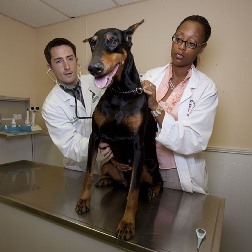How to Find the Right Veterinary Assistant College in Illinois
 Achieving your long term aspiration of working with and helping pets by enrolling in a veterinarian program in Illinois may at first feel like a daunting task. After all, you need to search for and enroll in a program that will provide the proper training to ensure that you can be successful as a vet technician, assistant or technologist. But just how do you go about analyzing and comparing programs so that you can make the best choice? Many future students launch their due diligence process by looking for schools that are close to their homes. After they have found some local schools, they determine which ones have the cheapest tuition and focus on those. Although location and expense are significant considerations when comparing vet tech schools, they are not the only significant ones when making your assessments. Qualifications such as accreditation and internship programs need to be considered also. The main idea is that there are questions you ought to be asking the veterinary tech programs you are considering before you make a final choice. We have provided several within this article in order to help get you started, but before we review them we’ll discuss the different duties of veterinary assistants and techs and the training alternatives offered.
Achieving your long term aspiration of working with and helping pets by enrolling in a veterinarian program in Illinois may at first feel like a daunting task. After all, you need to search for and enroll in a program that will provide the proper training to ensure that you can be successful as a vet technician, assistant or technologist. But just how do you go about analyzing and comparing programs so that you can make the best choice? Many future students launch their due diligence process by looking for schools that are close to their homes. After they have found some local schools, they determine which ones have the cheapest tuition and focus on those. Although location and expense are significant considerations when comparing vet tech schools, they are not the only significant ones when making your assessments. Qualifications such as accreditation and internship programs need to be considered also. The main idea is that there are questions you ought to be asking the veterinary tech programs you are considering before you make a final choice. We have provided several within this article in order to help get you started, but before we review them we’ll discuss the different duties of veterinary assistants and techs and the training alternatives offered.
The Function of a Veterinary Assistant and Tech
 Among the first decisions that you will need to make is whether you plan to train as a vet assistant, technician or technologist. Part of your preference might be predicated on the amount of time and money that you have to invest in your training, but the principal determiner will probably be which specialization interests you the most. What vet techs and assistants share in common is that they all work under the direct supervision of a licensed and practicing veterinarian. And even though there are numerous functions that they can perform within the Illinois veterinary clinic or hospital, they can’t prescribe medications, diagnose conditions, or carry out surgeries. In those areas they may only provide assistance to a licensed vet. There are technologists and technicians that work outside of the conventional veterinarian practice, such as for zoos, animal shelters or police departments. Let’s take a look at the duties and education requirements for each position.
Among the first decisions that you will need to make is whether you plan to train as a vet assistant, technician or technologist. Part of your preference might be predicated on the amount of time and money that you have to invest in your training, but the principal determiner will probably be which specialization interests you the most. What vet techs and assistants share in common is that they all work under the direct supervision of a licensed and practicing veterinarian. And even though there are numerous functions that they can perform within the Illinois veterinary clinic or hospital, they can’t prescribe medications, diagnose conditions, or carry out surgeries. In those areas they may only provide assistance to a licensed vet. There are technologists and technicians that work outside of the conventional veterinarian practice, such as for zoos, animal shelters or police departments. Let’s take a look at the duties and education requirements for each position.
- Vet Assistants in the majority of cases will have undergone a formal training program, either as an apprentice or intern in a vet clinic or hospital, or by completing a certificate program at a community college or vocational school in Illinois. As the name implies, their job function is to assist the vets and vet techs in the performance of their duties. Generally they are not associated with more involved tasks, for instance assisting with surgical procedures. Some of their typical responsibilities may include working at the front desk, preparing and cleaning exam rooms and equipment, or controlling pets during exams.
- Vet Technicians go through more advanced training compared with assistants and generally acquire a 2 year Associate Degree, preferably from an American Veterinary Medical Association (AVMA) accredited program. They are in a sense the veterinarian equivalent of medical nurses, since their basic job function is to assist veterinarians with diagnosing and treating animal patients. Where they stand apart from veterinary assistants is that they are included in more complicated activities, for example assisting with surgeries or providing medicine. All states presently mandate that vet technicians pass a credentialing examination for either registration, certification or licensing.
- Vet Technologists are comparable to vet techs and basically perform the same job functions. They are mandated to earn a Bachelor’s Degree in veterinary technology, which generally requires four years. Therefore the only real distinction between a vet technician and a technologist is the technologist’s higher level of education. But with an advanced degree comes more career opportunities, increased salaries and potential management positions. They are additionally required to pass a credentialing exam for either registration, certification or licensing.
Veterinary techs and technologists can specialize in areas such as internal medicine, anesthesia or emergency care. A number may earn certification from the American Association for Laboratory Animal Science (AALAS) to work in labs or Illinois research facilities also.
Online Veterinarian Degree Programs
 An alternative that may make sense for those with a hectic lifestyle or who are working full time while going to vet school is to enroll in an online program. Since the classes are made available over the internet, students can attend on their own timetable wherever a computer is accessible. The curriculum is taught using various methods, including videos, slide shows and live streaming webinars. And since many vet tech and technologist degrees require practical training, that portion can typically be carried out as an internship or work study program at a local Illinois veterinary clinic or hospital. Distance learning, as it is also called, can in some instances decrease the cost of your education. Tuition and ancillary expenses, for example for commuting and study materials, can be more affordable compared to more conventional classroom programs. Just confirm that the program that you enroll in is accredited, either by the AVMA or another nationally certified accrediting agency. With the online courses and the practical training, everything is furnished for a complete education. So if you are disciplined enough to learn in this more self-reliant manner, an online veterinary tech or assistant program may be the perfect option for you.
An alternative that may make sense for those with a hectic lifestyle or who are working full time while going to vet school is to enroll in an online program. Since the classes are made available over the internet, students can attend on their own timetable wherever a computer is accessible. The curriculum is taught using various methods, including videos, slide shows and live streaming webinars. And since many vet tech and technologist degrees require practical training, that portion can typically be carried out as an internship or work study program at a local Illinois veterinary clinic or hospital. Distance learning, as it is also called, can in some instances decrease the cost of your education. Tuition and ancillary expenses, for example for commuting and study materials, can be more affordable compared to more conventional classroom programs. Just confirm that the program that you enroll in is accredited, either by the AVMA or another nationally certified accrediting agency. With the online courses and the practical training, everything is furnished for a complete education. So if you are disciplined enough to learn in this more self-reliant manner, an online veterinary tech or assistant program may be the perfect option for you.
Things to Ask Vet Assistant and Technologist Training Programs
 By now you should have selected which veterinary certificate or degree that you want to attain, and if you prefer to study online or attend a college on campus. Since there are an abundance of veterinarian community colleges, vocational and trade schools in Illinois as well as across the United States, you need to ask some important questions to help narrow down your list of alternatives. As we discussed in our introduction, many future students start by concentrating on location and the cost of tuition. But we have previously touched on other significant qualifiers, for instance accreditation and internship programs. And obviously you want to choose a school that offers the degree and specialty that you want to earn. These and other factors are reviewed in the list of questions that you need to ask the vet assistant and technician schools that you are considering.
By now you should have selected which veterinary certificate or degree that you want to attain, and if you prefer to study online or attend a college on campus. Since there are an abundance of veterinarian community colleges, vocational and trade schools in Illinois as well as across the United States, you need to ask some important questions to help narrow down your list of alternatives. As we discussed in our introduction, many future students start by concentrating on location and the cost of tuition. But we have previously touched on other significant qualifiers, for instance accreditation and internship programs. And obviously you want to choose a school that offers the degree and specialty that you want to earn. These and other factors are reviewed in the list of questions that you need to ask the vet assistant and technician schools that you are considering.
Is the Veterinary Program Accredited? It’s essential that you confirm that the vet assistant or technician college you choose is accredited by a regional or national accrediting organization. As previously mentioned, one of the most highly respected is the American Veterinary Medical Association (AVMA). Trade schools and colleges that are accredited by the AVMA have undergone a demanding screening process that confirms you will get a quality education. Also, accreditation is important if you are applying for a student loan or financial aid, since a large number of programs are not offered for non-accredited colleges. And finally, having a degree or certificate from an accredited school is frequently a prerequisite for employment for many Illinois veterinarian clinics and hospitals.
What is the School’s Reputation? The veterinary college or vocational school and program you select should have an excellent reputation within the veterinary community. You can initiate your due diligence by asking the schools you are reviewing for endorsements from the employers in their job assistance network. Other tips include checking with online school ranking websites and contacting the school’s accrediting organizations as well. You can ask the Illinois school licensing authority if there have been any complaints or infractions involving your targeted schools. As a final suggestion, call some veterinary clinics that you may want to work for after you get your training. Ask what they think about your school selections. They might even recommend one or more colleges not on your list.
Are there Internship Programs? The most effective approach to obtain practical hands on training as a vet assistant or technician is to work in a clinical environment. Ask if the colleges you are considering have internship programs established with local veterinarians, vet hospitals or clinics. The majority of veterinary medicine programs require clinical training and many furnish it through internships. Not only will the experience be valuable regarding the clinical training, but an internship may also help build connections in the local Illinois veterinarian community and assist in the search for a job after graduation.
Is there a Job Assistance Program? Getting a job after graduating from a veterinary assistant or tech school may be challenging without the help of a job placement program. To start with, ask what the graduation rates are for the colleges you are reviewing. A low rate might indicate that the teachers were unqualified to teach the curriculum or that some students were unhappy with the program and dropped out. Next, confirm that the schools have a job placement program and ask what their placement rates are. A higher placement rate might mean that the Illinois program has an excellent reputation within the vet community and has a substantial network of contacts for student placements. A lower rate might signify that the training is not well thought of by employers or that the job placement program is a failure at placing students.
How Large are the Classes? If the classes are larger sized, you probably will get little or no personalized instruction from the teachers. Solicit from the Illinois colleges you are looking at what their class student to teacher ratios are. You might also decide to attend a few classes (if practical) to observe the interaction between teachers and students. Get feedback from students regarding the quality of instruction. Also, talk with the teachers and determine what their backgrounds are as well as their methods of teaching.
Where is the Campus Located? Yes, we previously discussed location, but there are a few more points to make on the topic. If you are planning to commute to your vet tech classes from home or work, you have to make sure that the commuting time fits into your schedule. For instance, driving during the weekend to check out the route won’t be the same as the commute during rush hour traffic, particularly if the Illinois campus is located in or close by a large city. In addition, if you do opt to enroll in a school in another state or even outside of your County of residence, there may be higher tuition costs particularly for community and state colleges. On the other hand, taking online classes may be an option that will give you more flexibility and minimize the necessity for travel.
Is the Class Schedule Flexible? And finally, it’s imperative that you ascertain if the Illinois veterinarian schools you are considering offer class times flexible enough to fit your schedule. For example, many students continue to work full time and can only attend classes on the weekends or in the evenings. Others might only be able to attend class in the morning or in the afternoon. Verify that the class times you need are offered prior to enrolling. In addition, determine if you can make up classes that you might miss due to work, illness or family responsibilities. You might find that an online school is the ideal solution to fit your veterinary training into your active life.
Pick the Best Vet Technician Program in Illinois
Enrolling in the right vet assistant or tech program is a crucial first step to starting a fulfilling career providing treatment and care for pets and livestock. Potential students looking into veterinary assistant or tech colleges need to make their selection based on a number of key issues. Vet assistants, techs and technologists work in veterinary clinics and hospitals and animal shelters. They typically handle administrative tasks and support the veterinarian with the animals as needed. As we have covered, it’s essential that you select a veterinary medicine program that is both accredited and has an outstanding reputation within the field. This applies to online vet tech schools as well. By asking the questions included in our checklist for evaluating schools, you will be able to reduce your options so that you can make your final choice. And by picking the ideal school, you can accomplish your goal of becoming a vet assistant, technician or technologist.
